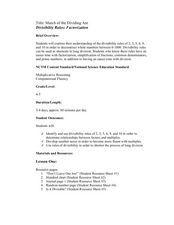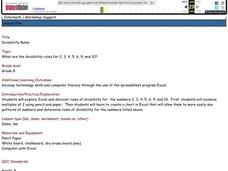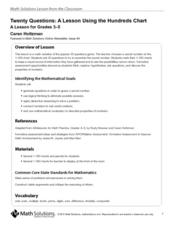National Endowment for the Humanities
Common Sense: The Rhetoric of Popular Democracy
Students identify important arguments for independence made in Thomas Paine's Common Sense. They explain why these arguments helped persuade American colonists that independence was necessary. Students describe the importance of Common...
Curated OER
Number Sense and Numeration: Multiples, Factors and Square Roots
A great resource for any math teacher covering multiples, factors or square roots; this instructional activity walks young mathematicians through the logic behind factoring and square roots with a systematic set of problems which...
Curated OER
Lesson 2: Using Common Sense
Tenth graders explore the impact of Thomas Paine on the American Revolution. In this colonial America lesson, 10th graders analyze Common Sense and then paraphrase selected excerpts of the pamphlet. Students also respond to discussion...
Curated OER
Number, Number Sense and Operations: Worksheet Four
Review a variety of mathematical skills with this worksheet. In this number sense and operations worksheet, learners solve 15 different problems that include simplifying various equations. In addition, they write the powers in order from...
Achievement Strategies
CCSS Unit Design Template for PE
From baseball and tennis to capture the flag and four-square, here is a great document that will help you design your next unit on a sport-related activity.
Curated OER
Number Sense and Operations
In this number sense and operations worksheet, students solve 15 different problems that include number lines and identifying various types of numbers. First, they solve a given equation and then check their work. Then, students find the...
Ohio Department of Education
Actions with Fractions: Adding and Subtracting Fractions with Common Denominators
Fourth graders develop a conceptual understanding of fractions and begin to add and subtract fractions with like denominators. Included is a worksheet to assess readiness and a teacher's checklist showing class understanding at a...
Curated OER
The Beginnings of Constitutional Government
Students examine excerpts of Thomas Paine's Common Sense. For this early American history lesson, students read Paine's pamphlet and analyze the information according the rubric provided.
Curated OER
Moving Toward Independence
Eighth graders identify the reasons why colonists were fed up enough to want to break free of colonial rule and create their own government. They complete an in-dept analysis of the pamphlet Common Sense and it's role in fueling the...
Statistics Education Web
Which Hand Rules?
Reaction rates vary between your dominant and nondominant hand ... or do they? Young scholars conduct an experiment collecting data to answer just that. After collecting data, they calculate the p-value to determine if the difference is...
Nemours KidsHealth
Head Lice: Grades 3-5
Keep lice away with a lesson that focuses on best practices. Scholars discuss what lice are, where it can be found, how it can be prevented and cured. A worksheet challenges pupils to examine items they use every day. A quiz gauges...
Curated OER
March of the Dividing Ant
Students inspect divisibility rules. In this divisibility rules lesson, students study the relationship between factorization and the divisibility rules for 2, 3, 5, 6, 9, and 10. Students read One Hundred Hungry Ants and A Remainder of...
Curated OER
Divisibility Rules
Eighth graders explore Excel and discover rules of divisibility for the numbers 2, 3, 4, 5, 6, 9, and 10; students examine multiples of 2 using pencil/ paper, then create a chart in Excel that will allow them to more easily see patterns...
Mathematics Vision Project
Module 8: Probability
It's probably a good idea to use the unit. Young mathematicians learn about conditional probability using Venn diagrams, tree diagrams, and two-way tables. They also take into consideration independence and the addition rules.
Statistics Education Web
Odd or Even? The Addition and Complement Principles of Probability
Odd or even—fifty-fifty chance? Pupils first conduct an experiment rolling a pair of dice to generate data in a probability lesson. It goes on to introduce mutually exclusive and non-mutually exclusive events, and how to use the...
Curated OER
Interactivate: Introduction to Functions
This interactive website provides a variety of lesson plans according to which standards you are applying and which textbook you use. Introduce functions to your class by having them construct single operation machines and create...
Curated OER
Twenty Questions: The Hundred Chart
Use the 20 Questions game to practice math vocabulary and number properties! Project a hundreds chart and hand one out to learners. Ideally, give them counters (beans would work well) to mark off the chart so you can play multiple times....
Scholastic
Study Jams! Prime & Composite Numbers
Prime or composite, that is the question. Teach your class how to find the answer with this step-by-step presentation that defines and provides examples of each type of number. When addressing larger numbers, divisibility rules are...
EngageNY
Ruling Out Chance (part 2)
Help your classes find the significance in this lesson! Learners analyze the probability of Diff values. They then determine if the difference is significant based on their probability of occurrence.
Noyce Foundation
Sewing
Sew up your unit on operations with decimals using this assessment task. Young mathematicians use given rules to determine the amount of fabric they need to sew a pair of pants. They must also fill in a partially complete bill for...
MARS - Mathematics Assessment Resource Service
Applying Properties of Exponents
The properties of exponents are all linked together and it is your mathematicians' job to discover and apply those rules. The comprehensive lesson begins with a pre-assessment task to check for prior knowledge and then goes into a...
KOG Ranger Program
Leading Causes of Wildfires in Oregon
You've heard of "wildfire season," but what types of weather and conditions lead to increased wildfires? Young firefighters learn about common sources of wildfires, safe ways to clear debris near their homes, and the most effective ways...
Noyce Foundation
Digging Dinosaurs
Build a function to solve problems rooted in archeology. A comprehensive set of five lessons presents problems requiring individuals to use functions. The initial lesson asks learners to find the possible number of dinosaurs from a...
Rational Number Project
Rational Number Project: Initial Fraction Ideas
Deepen the fractional number sense of young learners with this introductory lesson on equivalent fractions. After completing a short warm-up activity, children go on to work in pairs using fraction circles to complete a table of...

























